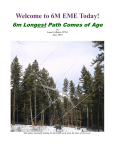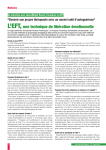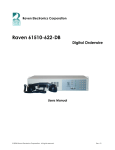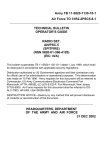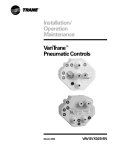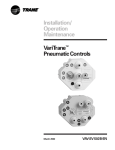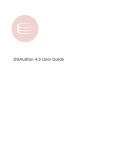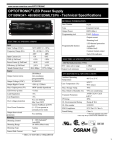Download Alcatel-Lucent MDR-8000 User's Manual
Transcript
Alcatel-Lucent MDR-8000 Packet Plus Digital Microwave Radio Flexible Wireless Transport for Your Voice, Video and Data Needs Introduction With more than 50 years of experience in wireless transmission, AlcatelLucent provides a solid foundation for your mission-critical network, and continually fosters visions for the future. As a pioneer in point-to-point microwave radios, Alcatel-Lucent has continually demonstrated its leadership in wireless technology. Our history of design innovation began when the former Collins Radio Company developed the first commercial microwave radios in the 1950s. Alcatel-Lucent maintains the Collins tradition, setting the industry standard for microwave communications all over the world with scalable, reliable, economical, and readily deployable wireless backbone communications systems. MDR-8000 Packet Plus Features and Benefits 2 Alcatel-Lucent | MDR-8000 Packet Plus – Proven Reliability – Ensures trouble-free operation – Broadest range of frequencies and capacities - 2, 4, 5.8, L6, U6, 8, 10, 11 GHz - 4, 8, 16, 32 DS1s; 1, 3 DS3s; OC-3; 50, 150 Mb/s Ethernet – Provides an ideal match for your system requirements and available spectrum – Common platform across all configurations – Minimizes spares and training requirements – Highest adjacent channel interference rejection – Allows operation in congested frequency bands – Robust operating characteristics - Highest system gain - Forward Error Correction - Multiple configurations available (nonstandby, hot-standby, space diversity, frequency diversity, quad diversity) – Delivers high availability on even the most troublesome paths, and allows longer paths to be implemented using smaller antennas – In-service capacity expansion – Provides economical and simple growth to meet your needs, with no stranded investment – Smallest size, with both indoor and outdoor installation options – Allows flexibility with system installation and location Overview The MDR-8000 Packet Plus is Alcatel-Lucent’s premier digital microwave radio for long-haul, point-to-point wireless communications. The flexible platform offers features designed to provide robust operation, while also reducing your total cost of ownership. With a common platform that supports virtually all frequency bands from 2-11 GHz, the MDR-8000 Packet Plus can meet your needs for high-capacity backbone routes, as well as lowcapacity spurs. It offers transmission capacity from 4-32 DS1s, 1-3 DS3s, OC-3, and 10/100/1000 Base-T Ethernet, with the ability to upgrade capacity in service simply by changing Capacity Keys™. The common platform that supports all of these options provides users ultimate flexibility in configuring and equipping an entire network, with simplified operation and maintenance. With the widest range of long-haul frequency bands, the most complete range of interfaces and capacities, and the highest system gain in the industry, the MDR-8000 is the undisputed leader in microwave transport. MDR-8000 Packet Plus Standard Shelf Configuration This flexible and scalable architecture provides reliable wireless backbone communications for cellular operators, public safety agencies, railways, pipelines, utilities, local exchange carriers, television stations, and private enterprise. Alcatel-Lucent | MDR-8000 Packet Plus 3 Applications Wireless Backhaul As cellular and PCS networks continue to grow, the MDR-8000 Packet Plus is an ideal choice for connecting cell sites or backhauling traffic to the switch. The broad range of capacities and frequency bands provide ultimate flexibility for both long- and short-haul applications. In addition, the high reliability typically provides vastly superior performance as compared to leased DS1 circuits, usually with a very attractive payback period. The unlicensed versions of the radio also permit rapid deployment of point-to-point links, allowing new cell sites to be turned up quickly to meet service demands. In addition, as backhaul networks transition from TDM to IP-based services, the MDR-8000 Packet Plus can manage the transition seamlessly by carrying both signal types simultaneously with unlimited flexibility. Carriers’ Networks Backhauling Last mile Aggregation Backbone Metro BSC/RNC BTS/Node B BSC/RNC 4 Alcatel-Lucent | MDR-8000 Packet Plus Public Safety Networks Public safety networks must provide mission critical services, be quickly expandable, and be easily managed from end to end. Applications may be for interfacility and inter-agency communications, or for backhaul in land mobile radio (LMR) networks. Public safety networks also face a variety of critical issues: interfacility communications are becoming more complex and require higher bandwidth; use of real-time video is increasing, as well as data – primarily IP traffic – to support departmental LANs and inter-departmental WANs; and the trend of sharing data across jurisdictions is accelerating the demand for more bandwidth. The MDR-8000 Packet Plus radio addresses all of these issues cost effectively, while providing the security and redundancy that public safety officials require. State and Local Government Systems Municipalities have similar needs as those of public safety operators. Municipal planning districts need converged services that support mission-critical voice, data, and video communications, along with LMR interoperability. Government agencies can rely on the MDR-8000 Packet Plus to provide the reliable, high-quality communications they require. Unlicensed versions of the MDR-8000 Packet Plus are also ideal for emergency restoration and backup of critical communication links. Public Safety Transportation and Utility Systems Transportation and utility companies also require the highest and most stringent level of availability, quality, and resiliency. Growth, new technologies, and everincreasing security demands require a secure core architecture with state-of-the-art network management in order to reach widely dispersed rural areas, often covering rough terrain, where no other infrastructure exists. Support for data networking applications and services such as SCADA, video surveillance for monitoring remote sections of pipelines or highways, and reliability to overcome homeland security threats are all readily addressed by the MDR-8000 Packet Plus. Utilities, Pipelines and Railroads Headquarters Alcatel-Lucent | MDR-8000 Packet Plus 5 Local Exchange Carriers The MDR-8000 Packet Plus is an ideal solution for extending a local exchange carrier’s network beyond their traditional franchise boundaries, whether it is one location outside the franchise area or multiple locations across a larger geographic region. Using the MDR-8000 Packet Plus can eliminate the LEC’s need to lease facilities from competitors, thus maintaining control of their entire solution offering regardless of whether the location is in or out of franchise. The MDR-8000 Packet Plus is also an option anywhere wireline services are not available due to fiber exhaustion or lack of facilities. Broadcast Auxiliary Service Digital microwave has proven itself as an excellent choice for broadcasters to transport their video signals, either as direct studio to transmitter links (STLs), or for distributing the video signals across large geographic areas to multiple transmitter sites. Broadcasters require their high-bandwidth signals to be transmitted with extremely high quality to avoid any video signal degradation. The MDR-8000 Packet Plus supports FCC Part 74 requirements, and has proven itself quite adept at meeting the stringent requirements of broadcasters all over the country. Digital TV Broadcasting Contribution Distribution Urban coverage Main Studio Regional Studio Regional Studio Distributed/Rural coverage 6 Alcatel-Lucent | MDR-8000 Packet Plus Federal Government Agencies The MDR-8000 Packet Plus also provides its rugged characteristics in service to the U.S. Federal Government. Operating in the NTIA-regulated frequency bands, the highly compact radio can mount in the tightest spaces while providing wireless means for overcoming geographic obstacles, right-of-way costs, and construction delays associated with wired facilities. This scalable and readily-deployable architecture provides reliable backbone communications for agencies such as the Department of Defense, Department of Justice, and Department of Interior, among others. Defense & Security Government buildings Government buildings Military bases 2-way Mobile Radio Military airports Port Security Police, Fire & Rescue Borders Private Enterprise Enterprise markets, such as education, healthcare, banking, and private corporations, can also benefit from the flexibility of the MDR-8000 Packet Plus. For campus or metropolitan environments, using the short-haul capabilities of the MDR-8000 Packet Plus can provide secure and reliable high-bandwidth services at low cost for one customer or an entire building. A large corporation or consortium can use the MDR-8000 Packet Plus to connect data and voice services between nationwide branch locations across a backbone network covering a large geographic area. As enterprise firms continue to face ever-decreasing budgets, the costeffective solutions and reliability provided by the MDR-8000 Packet Plus become even more attractive and beneficial. Alcatel-Lucent | MDR-8000 Packet Plus 7 Cost-Saving Features Industry-High System Gain The MDR-8000 Packet Plus has the highest system gain available today. System gain is the most common benchmark of performance that differentiates one radio from another. Used to determine the link budget of a microwave hop, it is simply defined as the mathematical difference between the radio’s transmitter output power and the receiver input threshold. Higher system gain provides network operators three distinct advantages. First, the higher gain can often allow users to install smaller antenna systems. This not only saves money on the cost of the antennas, but also reduces tower loading. Network operators can build lighter weight towers, or reduce their monthly rent payments if leasing tower space. Second, higher system gain allows users to stretch their paths further than a comparable radio with lower system gain. This can be especially important when crossing terrain obstacles, or simply to eliminate the significant cost of adding an additional repeater site. Finally, higher system gain improves the path availability. For mission-critical networks, extremely high path availability is one of the ultimate goals, a goal to which the MDR8000 Packet Plus is ideally suited. 8 Alcatel-Lucent | MDR-8000 Packet Plus Common Platform The MDR-8000 Packet Plus is based on a common platform for all frequency bands and capacities. This approach greatly simplifies training and maintenance, since all MDR-8000 Packet Plus radios look the same and operate in the same manner. Oftentimes, large networks consist of radios in two or more frequency bands, such as 6 GHz for a long-haul backbone, and 11 GHz for shorter paths or spurs. Thanks to the commonality built into the MDR-8000 Packet Plus, technicians need only be trained on one configuration and they will be capable of maintaining all versions deployed in their network. The same advantage also applies to the capacities available in the radio. The MDR-8000 Packet Plus platform supports a mix of DS1, DS3, OC-3, and 10/100/1000 Base-T Ethernet interfaces to meet any network requirements. In addition, the commonality of the system means that the number of spare modules required is minimized, even as radios of different capacities and frequency bands are deployed in the same network. For example, the transmitter, receiver, and power amplifier units in any specific frequency band may be used for NxDS1, NxDS3, OC-3, or Ethernet transport. Power supplies, controllers, and other common units are the same across all radios, regardless of frequency band or capacity. This commonality reduces the number of spares that need to be stocked, reducing the capital budget required for deployment. In-Service Capacity Upgrades The MDR-8000 Packet Plus offers the widest range of interfaces and capacities available today, with the ability to provide 4-32 DS1s, 1-3 DS3s, OC-3, or 10/100/1000 Base-T Ethernet in bandwidths up to 300 Mb/s. Besides having a capacity to fit virtually any requirement, users can increase the capacity of the specific circuit type (i.e. DS1 or DS3) being used by merely changing Capacity Keys™ on the transmitter and receiver modules. This simple change can be accomplished with the radios in service on hot-standby systems, with no outage or downtime required. The highly flexible MDR-8000 Packet Plus can grow from 4 DS1s all the way to 3xDS3 or OC-3 using the same set of power amplifier, transmitter, and receiver modules. Capacity Keys™ and wideband RF modules allow users to gracefully migrate to higher capacities, and eliminate any stranded investment. Flexible Ethernet Options Having established its reliability, scalability, and versatility in delivering TDM traffic, the MDR8000 Packet Plus is also poised for the next wave of network migration. With the industry-wide migration to IP data networks, carriers are requiring innovative ways to bridge the gaps between their legacy networks and the packet-based networks of the future. The MDR8000 Packet Plus Ethernet interface utilizes the same RF and common modules as the TDM versions of the radio, operating in all the same frequency bands and virtually identical bandwidths. The Ethernet interface supports 10/100/1000 Base-T transport, with a possible combined data throughput of 300 Mb/s in a single shelf. The Ethernet I/O card offers RJ45 electrical and SFP optical inputs, both of which are auto-sensing. In addition, the Ethernet interface supports a variety of bandwidth choices which enables users to tailor the radio to meet facility and data transport requirements of today and tomorrow. The Ethernet interface of the MDR-8000 Packet Plus also allows users to gracefully migrate their network services from TDM to Ethernet with no equipment changeout. Up to 32 DS1s (48 Mb/s) can be individually and dynamically provisioned to carry TDM traffic alongside the Ethernet bandwidth. As TDM services get converted to IP over time, each of the TDM-based DS1s can be deprovisioned individually, allowing that bandwidth to be recaptured as part of the Ethernet bandwidth. Provisioning (or deprovisioning) can be done in-service, with no disruption to other DS1 or Ethernet traffic on the radio. Unlike standard TDM radios, the Ethernet version of the MDR-8000 Packet Plus offers input/output (I/O) provisioning options and operating modes uniquely developed to support packet data transport: ■ A Only – Nonstandby While the most cost-effective method of transporting Ethernet, this operating mode provides no Ethernet port or radio link protection. ■ A Only – Hot Standby This operating mode provides radio link protection, but does not provide Ethernet port protection. This mode would be used when the operator desires link protection, but cannot support redundant interfaces in the Ethernet device connected to the MDR-8000 Packet Plus. ■ A & B Switched – Hot Standby By making use of the Ethernet Port Switching capabilities of the MDR-8000 Packet Plus, this mode provides both Ethernet port and radio link protection. ■ A & B Summed – Hot Standby This operating mode utilizes the Ethernet Port Aggregation capabilities of the radio and combines two data sources over a single RF link. ■ A & B Separate – Dual Channel The dual channel configuration uses the same hardware as a frequency diversity configuration in a TDM version of the radio. It provides two separate RF channels from a single shelf. The A & B Separate operating mode can support a combined data throughput of 300 Mb/s in a single shelf. However, if one of the RF channels failed, half of the data would be lost, although the DS1s would still be protected. ■ A & B Summed – Dual Channel This mode also makes use of the Ethernet Port Aggregation capabilities of the radio. When the radio is operating in normal mode without failures, it operates in a similar manner as the A & B Separate – Dual Channel. The A & B Summed mode also supports a combined data throughput of 300 Mb/s in a single shelf. In this configuration, the full 300 Mb/s radio bandwidth is available to either Ethernet input to handle traffic bursts. In addition, if one of the RF channels fails, the data is summed onto the remaining working channel and the throughput of the shelf falls back to a combined total of 150 Mb/s. The DS1s are always protected. Alcatel-Lucent | MDR-8000 Packet Plus 9 Licensed and Unlicensed Operation The MDR-8000 Packet Plus takes advantage of virtually all of the licensed frequency bands used for long-haul systems in North America. Operating from 2 to 11 GHz in all of the FCC Part 101 and Part 74 bands, as well as bands used by the Federal Government (NTIA), the MDR-8000 Packet Plus allows operators the freedom to select the band most appropriate to their intended use and environmental conditions. A list of the frequency bands of operation is shown below: • 1700 MHz (NTIA) • 1900 MHz (PCS in-band) • 2 GHz (FCC broadcast, NTIA & ITU) • 2.3 GHz (WCS band) • 2.4 GHz (Unlicensed band) • 2.47 GHz (FCC licensed) • Upper 4 GHz (NTIA, ITU) • 5.8 GHz (Unlicensed ISM band) • Lower & Upper 6 GHz (FCC, ITU) • 7 GHz (FCC broadcast auxiliary) • 7 & 8 GHz (NTIA, ITU) • 10.5 & 11 GHz (FCC, ITU) In addition, the MDR-8000 Packet Plus also offers the same robust operation in the unlicensed bands of 2.47 and 5.8 GHz. Offering more configurations, more frequency selections, and more capacity than any other unlicensed radio, the highly-reliable MDR-8000 Packet Plus provides superior signal quality and availability. By operating in either the unlicensed (Part 15) or licensed (Part 101) portion of the 2.4 GHz frequency band (2.400 2.4835 GHz), the MDR-8000 Packet Plus offers a unique networking option. In licensed operation, the higher power 10 Alcatel-Lucent | MDR-8000 Packet Plus transmitters and direct modulation overcome most interference and improve overall system quality. Unlicensed operation offers the same spectral efficiency and provides an option for transporting up to 16 DS1s or 24 Mb/s Ethernet. In the 5.8 GHz band, up to 150 Mb/s can be carried on a single channel. Operation in the 2.4 GHz spectrum also allows users of 2.1 GHz licensed systems who need to relocate the ability to leverage their existing infrastructure without touching the tower, antenna, or transmission line. Reuse of existing antenna systems and tower structures provides a definite cost savings and reduction in cutover time as compared to other relocation alternatives. Furthermore, operators can take advantage of lightweight grid antennas and coaxial transmission line to limit tower loading concerns and minimize environmental impact issues. Also, the 2.4 GHz band can be used to place new links in service, thereby taking advantage of the excellent propagation and low-impact antenna configurations allowed by this frequency range. As with all of the licensed versions of the MDR-8000 Packet Plus, the unlicensed radios employ a narrowband single-carrier modulation technique with highreceiver selectivity. This technique provides dramatically superior properties as compared to most other unlicensed radios which are of the direct sequence spread spectrum type. Due to the poor peak to average power characteristics of spread spectrum modulation, transmitter power is significantly lower than that of the MDR-8000 Packet Plus. That means the MDR8000 Packet Plus can deliver more power to the receiver, which significantly helps to overcome interference. In practical terms, the MDR-8000 Packet Plus can operate with an antenna one size smaller than a spread spectrum radio on paths longer than 8 miles. The narrowband modulation of the MDR-8000 Packet Plus also allows better utilization of the available spectrum, as multiple RF channel pairs can be utilized. This is especially helpful at multi-way junction sites where a wider array of selectable frequencies is required to avoid intra-system interference. The 5.8 GHz version of the MDR8000 Packet Plus is also an ideal way to add additional capacity as an underlay on existing 6 GHz routes. Simply adding bandpass filters allows the MDR-8000 Packet Plus to interoperate on the same antenna system as the existing 6 GHz system. This is an ideal scenario for customers with legacy TDM systems (even analog) who want to add Ethernet capabilities on the same route. Thanks to the commonality between the licensed and unlicensed versions of the MDR-8000 Packet Plus, it is also a relatively simple task to upgrade an unlicensed radio at 5.8 GHz to licensed operation at 6 GHz. By simply making a few changeouts, there is no stranded investment involved in having to purchase a new radio. For applications that require quick and efficient deployment in the 5.8 GHz unlicensed band, AlcatelLucent has created a special lowprofile configuration called the MDR-8000 Lite. The MDR-8000 Lite is a reduced-size package for nonstandby unlicensed configurations. Offering 8 DS1s of capacity with +25 dBm transmit power, it is compatible with all other configurations of the MDR-8000 Packet Plus family. Many network architectures do not require the built-in 1+1 equipment redundancy of the standard MDR8000 Packet Plus shelf. Low-density microwave routes with less than 8 DS1 requirements are commonly equipped with 1+0 protection. Additionally, when radio is used for back-up to other wireline facilities, redundancy of the radio electronics is usually not required. Even highly secure networks that utilize ring protection switching don’t require redundant radio electronics, since service protection is provided by the circuit multiplexers, not the radio link. The low-profile MDR-8000 Lite radio is ideal for these applications. Alcatel-Lucent | MDR-8000 Packet Plus 11 Wayside DS1s Alcatel-Lucent’s MDR-8000 Packet Plus provides one DS1 hot-standby protected wayside signal per DS3 equipped on the radio. Therefore, a 1xDS3 radio also includes one wayside DS1, and a 3xDS3 or OC-3 radio offers three wayside DS1 circuits. These ancillary DS1 channels can be used for maintenance circuits (quick, easy introduction of additional orderwires, data channels, and LAN/WAN circuits), or they can be used to carry critical traffic since they are fully redundant in hot-standby radio configurations. Furthermore, implementing wayside DS1 channels does not impact radio performance or detract from the payload bandwidth. High Reliability Maintenance costs are greatly reduced by the high reliability built into the MDR-8000 Packet Plus platform. The robust MDR-8000 Packet Plus has a proven track record of stellar performance in missioncritical networks of all types. Alcatel-Lucent is so confident of its performance, that we offer a 2 year warranty on all configurations. Low Power Consumption With extremely low power consumption (as much as 1/3 less than many competitors), the MDR8000 Packet Plus saves you money up front by reducing the size of the DC power plant that is required for operation. Also, if the site uses batteries for emergency backup power, fewer of them will need to be purchased and deployed. In addition, low power consumption also means significantly less heat dissipation. Again, the MDR-8000 Packet Plus saves money by reducing the size of the air conditioning system required, and lowers your monthly cooling costs. 12 Alcatel-Lucent | MDR-8000 Packet Plus MDR-8000 Compact Shelf MDR-8000 Compact Shelf in Outdoor Cabinet The MDR-8000 Packet Plus efficiently dissipates heat via a passive heat sink on the rear of the radio. High-thermal-load modules are directly coupled to the heat sink with secure mechanical connections and self-checking thermal sensors to guarantee optimal heat flow. As a result, the MDR-8000 Packet Plus hot-standby shelf does not require fans, except for radios equipped with high power transmitters, or when more than one radio is mounted in the same rack. Small Size When installing a radio in a shelter at the base of a tower, space is usually at a premium. Compact mechanical dimensions and low power consumption allow operators to place the MDR-8000 Packet Plus in cramped spaces without sacrificing system performance and availability. As the smallest all-indoor radio terminal on the market today, a fully protected configuration can be deployed in just 7 rack units (7 RU). By reducing the amount of rack space needed, the MDR-8000 Packet Plus is adaptable to virtually all installation environments. For high-capacity applications, four hotstandby radios may be equipped in a single 19-inch rack for up to 12 DS3 capacity. MDR-8000 Compact Shelf For applications where hot-standby operation is not needed or desired, such as low-density links or radio ring terminal nodes, the MDR-8000 Packet Plus offers a reduced-size chassis called the Compact shelf. This nonstandby configuration is even smaller (only 4 RU), and is applicable to the entire product line, covering all frequency bands and all capacities of the MDR-8000 Packet Plus family. Also, operators are increasingly seeing the need to locate radio equipment at sites that lack space for traditional indoor installations, yet don’t want the headaches associated with tower-mounted electronics. The MDR-8000 Compact offers an ideal solution for such situations with a polemounted outdoor enclosure. This configuration allows operators to set up a microwave terminal simply by affixing the Compact cabinet to an available pole or wall, or simply by setting a 4 ½” steel pipe in the ground. Performance-Enhancing Features Robust Multipath Countermeasures The MDR-8000 Packet Plus employs several techniques to overcome troublesome path propagation problems. Dispersive Fade Margin (DFM) is a critical performance parameter that gauges a radio’s ability to overcome the multipath fading events which can occur on long paths (over 7 miles). The MDR-8000 Packet Plus leads the industry in DFM, which allows it to provide the highest path availability of all long-haul systems. All-Indoor Operation The compact shelf design, coupled with the wide array of transmitter power options available, allows the entire MDR-8000 Packet Plus to be mounted indoors. With no towermounted electronics to worry about, maintenance and troubleshooting are greatly simplified. The entire radio is readily accessible without the need for climbing towers. Network technicians do not need tower-climbing certification in order to maintain the radios. This is of primary importance during inclement weather. Choice of Modulation Techniques The MDR-8000 Packet Plus utilizes both 32 and 128 Trellis Code Modulation (TCM), and 64 Quadrature Amplitude Modulation (QAM) to take full advantage of FCC licensing rules based on spectrum efficiency. Using 128 TCM enables the MDR-8000 Packet Plus to squeeze maximum capacity in the allowed channel spacings, while maintaining robust path performance. This can provide the critical difference during coordination in areas where frequency bands are highly congested. Where wider channels are allowed, 32 TCM occupies a wider spectrum, but offers even higher system gain. This allows paths to be stretched even further, while still maintaining extremely high path availability. Where rules allow, typically at lower capacities, both modulation versions are available, giving users the option of maximum system gain or maximum spectral efficiency, with the choice determined by the unique path requirements being addressed. at the far end of the link. This is far superior to competing radios which merely turn the far-end transmitter to full power whenever the receive signal level crosses the ATPC threshold. FCC regulations limit full-power operation to 52 minutes per year (0.01%) for a radio licensed with ATPC. Since the MDR-8000 Packet Plus with its dB-for-dB adjustment will not reach full power as often, the MDR-8000 Packet Plus can operate much longer in the ATPC mode. Industry-Leading Receiver Selectivity and Interference Rejection Alcatel-Lucent utilizes all-digital receiver filtering, other than RF filters, which provides vastly superior interference immunity when compared to analog designs. The MDR-8000 Packet Plus exhibits superior adjacent channel performance as evidenced by the -8 dB adjacent channel threshold/ interference specification (10 MHz channel separation). This greatly eases coordination, especially in frequency-congested areas, and speeds up the licensing process. In addition, it improves system availability in an interference environment. Network Management Options The MDR-8000 Packet Plus provides three 64 kb/s service channels and one 16 kb/s supervisory channel. Each service channel can carry audio (orderwire), RS-232 data, or MCS11/TBOS/SNMP fault alarm data. Automatic Transmit Power Control (ATPC) To further enhance the ability of the MDR-8000 Packet Plus to operate in a frequency-congested environment, ATPC is a standard feature that may be used to allow coordination at a reduced transmit power level. Only in the event of a path fade condition does the transmit power increase to overcome the fading. The ATPC control loop on the MDR-8000 Packet Plus makes dB-for-dB adjustments to the transmitter power corresponding to changes in the receive signal level For local display and control, in addition to the LED displays and module controls, a user-friendly graphical interface operating on an IBM-compatible PC is also available. The user system interface (USI) provides a graphical and intuitive means of analyzing the radio, and runs on a standard Windows operating system. With the USI, technicians can monitor alarms and performance data in real time, as well as initiate controls and provision the radio. The radio controller and USI also provide a powerful tool for analyzing path performance and troubleshooting radio equipment operation. The receive signal level (RSL) performance data is collected and can be viewed in a meaningful format, allowing path performance to be analyzed over time to interpret propagation anomalies. The MDR-8000 Packet Plus also offers a choice of network management interfaces and Alcatel-Lucent | MDR-8000 Packet Plus 13 protocols. The parallel interface provides access to radio and station information, including both radio and station alarms and status, as well as controls. The serial interface supports a variety of network management protocols including MCS-11, E2A/TBOS, and SNMP. The MCS-11 protocol consists of RS-422 formatted data which can be transported over one of the MDR-8000’s 64 kb/s digital service channels, independent of the radio traffic, to an external MCS-11 Monitor Control System. MCS-11 is a 4-wire, poll/response, synchronous, half-duplex monitor and control system whereby a master (primary) station polls one remote (secondary) station at a time and waits for a response before polling the next station. Poll and response messages are carried in the service channel transparent overhead bit streams. E2A/TBOS (telemetry byte-oriented serial) is a 4-wire serial interface conforming to the EIA RS-422 standard per Telcordia (Bellcore) Publication 49001. Poll and response messages are communicated to the radio via an external fault alarm remote or PC. Increasingly, as telecommunications networks evolve, network operators are scrambling to harmonize management of equipment that spans multiple vendors and multiple protocols. SNMP allows network operators to bring equipment 14 Alcatel-Lucent | MDR-8000 Packet Plus together under one common network management umbrella. Based on Telecommunications Management Network (TMN) standards, SNMP provides a vehicle to improve interoperability between equipment vendors and simplify network management for operators. SNMP network management is enabled in new or existing MDR-8000 Packet Plus radios by the simple installation of the optional TMN interface module. The TMN interface module supports SNMP transport over TCP/IP LAN and serial point-topoint facilities. The MDR-8000 Packet Plus is compatible with SNMP V1, V2, and V3. The SNMP MIB (management information base) for the MDR-8000 Packet Plus supports complete management (alarms, status, controls, performance, and provisioning) of the radio. In addition, the MDR-8000 Packet Plus supports a feature called the Extended Link Monitor Channel (ELMC). A standard feature of the radio, the ELMC extends the functionality of the User System Interface (USI) to allow the local craft person to remotely view the provisioning, alarms, and status information and control commands for any radio, contiguously connected to the network. The performance monitoring, alarm and status information, and remote controls are accessible through the ELMC channel, independent of network management interfaces. Remote provisioning and downloading capability is also supported by the ELMC channel. Full Range of Configurations The MDR-8000 Packet Plus radio family is available in a full range of configurations, to meet every network requirement and budget constraint. Nonstandby and hotstandby configurations are supported in both linear and ring modes, while frequency diversity and collapsed rings are also available. In addition to equipment protection, space diversity receivers can be combined with any of these configurations to overcome path propagation problems. With a dual receiver module available, space diversity can be easily added to nonstandby radios at minimal cost. The dual receiver module supports space diversity operation, economically and efficiently, in the same profile as a traditional single receiver subsystem. For ultimate path protection, both space and frequency diversity can be combined in a quad-diversity configuration. When using the dual receiver module in quad diversity configurations, all four receivers can be populated in a single shelf, minimizing the size of the deployed system. Quad diversity is extremely useful for overcoming the challenges of troublesome paths, such as those covering very long distances or transmitting over water. For microwave routes that require high-density cross sections, such as multiple OC-3 channels, the MDR8000 Packet Plus also provides a MultiChannel configuration. While historically these applications have been addressed by multiline systems, there are some drawbacks to that approach. With a MultiChannel configuration, each working channel has 100% equipment protection, unlike multiline systems that share a single protect channel across each working channel. This provides higher reliability, and can protect against hardware failures on multiple channels. Also, switching restrictions based on priority are eliminated. By removing the requirement for a separate protection channel, frequency coordination is simplified and spectrum is freed up for an additional working channel. Likewise, by eliminating the multiline switch functions, maintenance is greatly simplified. The MDR-8000 Packet Plus MultiChannel hardware and software is totally compatible with all other configurations of the radio. The common network management and maintenance practices were designed to simplify operation. Network Expertise In addition to having the most complete microwave portfolio in the industry, Alcatel-Lucent is also able to offer our customers complete, integrated systems, incorporating numerous technologies from our broad portfolio of telecommunications products. Our design and engineering expertise incorporates virtually all aspects of telecommunications networks. We also offer powerful network management platforms to give customers end-to-end visibility and control over complex networks with multiple products. With all these technologies, we give our customers several choices on how to build their networks. We are there every step of the way to help you make the best use of the right products to meet your needs. And when we put these products together to form a custom solution to meet your needs, our first-hand experience assures that everything works seamlessly. Alcatel-Lucent’s ownership of the technology in the systems we sell gives our customers more options, more depth and greater peace of mind. Summary MDR-8000 Packet Plus MultiChannel Configuration – Four OC-3s or 1.2 Gb/s in a Single 7' Rack The MDR-8000 was a breakthrough design at its introduction, and the forward-thinking platform is so advanced that it continues to lead the industry today. With unmatched capabilities for meeting unique customer requirements, the MDR-8000 Packet Plus is unrivaled in its flexibility and performance. Whether the need is for low capacity versus high capacity, TDM versus Ethernet, or short-haul versus long-haul transmission, the MDR-8000 Packet Plus offers configurations to provide any level of protection or path availability. When your network requirements call for wireless transmission, the logical choice is to look to the microwave experts at Alcatel-Lucent. Let us put our expertise to work for you by demonstrating how the MDR-8000 Packet Plus can satisfy your specific applications. Alcatel-Lucent | MDR-8000 Packet Plus 15 www.alcatel-lucent.com Alcatel, Lucent, Alcatel-Lucent and Alcatel-Lucent logo are trademarks of Alcatel-Lucent. All other trademarks are the property of their respective owners. The information presented is subject to change without notice. Alcatel-Lucent assumes no responsibility for inaccuracies contained herein. © 2007 Alcatel-Lucent. 04-04-08 All rights reserved. 523-0620296-004A3J
















